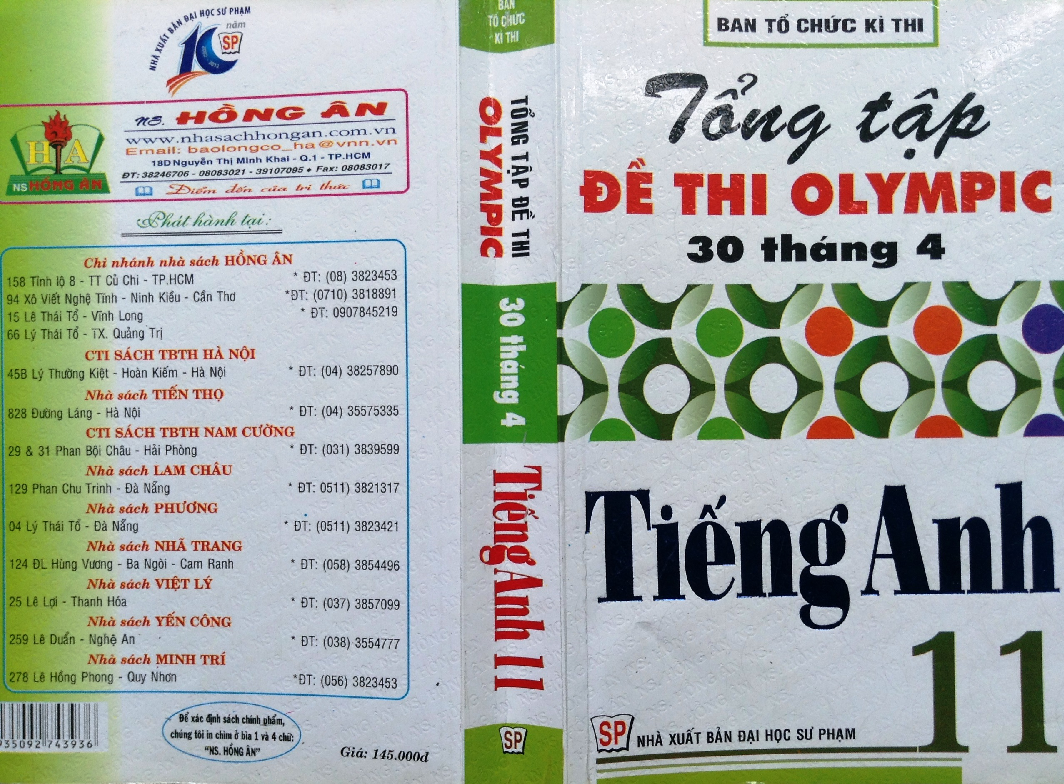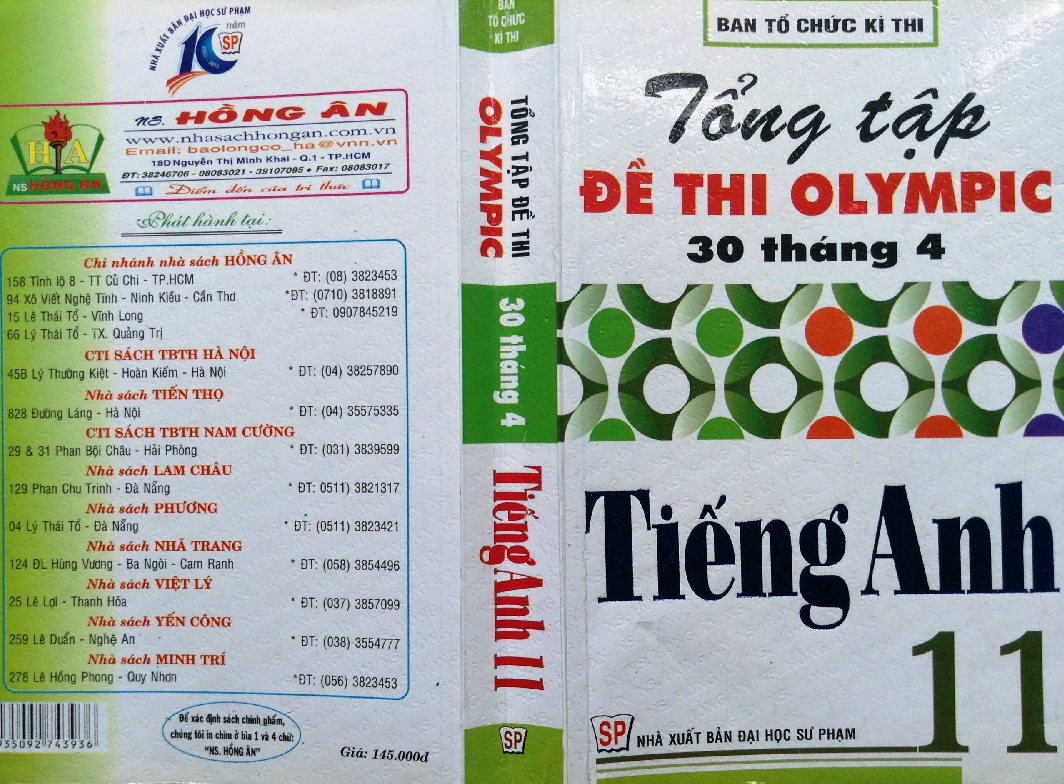









Preview text:
SỞ GIÁO DỤC VÀ ĐÀO TẠO TỈNH ĐẮK LẮK
TRƯỜNG THPT LÊ HỒNG PHONG
KỲ THI OLYMPIC 10-3 LẦN THỨ IV, NĂM 2019
ĐỀ THI ĐỀ NGHỊ MÔN: TIẾNG ANH LỚP 11 A. MULTIPLE CHOICE TEST: I. PHONOLOGY: (10 pts )
Choose the word whose underlined part is pronounced different from that of the others. 1. A. arrived B. linked C. lived D. opened 2. A. explanation B. main C. faint D. paint 3. A. copious B. obese C. drone D. clamorous 4. A. germ B. gesture C. gene D. gear 5. A. manufacture B. mature C. pasture D. nature
Pick out the word that has the stress syllable differently from that of the other words. 6. A. trigonometry B. explanatory C. immediately D. democracy 7. A. legislature B. repository C. magnificent D. mistake 8.
A. argumentative B. psychological C. contributory D. hypersensitive 9. A. photograph B. payroll C. accent D. regretful 10. A. majority B. ceremony C. astronomy D. investiture YOUR ANSWER: 1. B 2. A 3. D 4. D 5. B 6. A 7. A 8. C 9. D 10. B II. VOCABULARY: (10 pts)
11. I_______that you won’t be invited that awful woman to the meeting.
A. assume B. instruct C. construct D. rely
12. He has put his car entirely at our_______for the holiday.
A. usage B. disposal C. pleasure D. disposition
13. His bank had never been _______of his change of address.
A. contacted B. notified C. acquainted D. communicated
14. The police were very _______in their examination of the building.
A. exhausting B. intense C. thorough D. concentrated
15. The roadwork made _______to the hotel from the main road difficult.
A. entrance B. approach C. access D. ways in
16. After he set fire to the library, the boy was_______from school.
A. expelled B. excluded C. exiled D. extracted
17. The museum wishes to_______an assistant curator for its fossil collection.
A. appoint B. commission C. authorize D. assign
18. They can’t _______on a name for the baby.
A. conclude B. decide C. consent D. assent
19. They could find no_______of the missing car despite an extensive search.
A. clue B. remnant C. indication D. trace
20. I am never free on Tuesday evenings as I have a_______arrangement to go to the cinema with a friend.
A. long-standing B. long-lived C. long-range D. long-lasting YOUR ANSWER: 11. A 12. B 13. B 14. C 15. C 16. A 17. A 18. B 19. D 20. A
III. GRAMMAR AND STRUCTURES: (10 pts)
21. The man refused _______ to the hospital.
A. taking B. being taken C. taken D. to be taken
22. Sally speaks _______ French. She even can't use her French to ask for directions.
A. few B. a few C. little D. a little
23. Some snakes lay eggs, but _______ give birth to live offspring.
A. others B. the other C. other D. the others
24. In most _______ developed countries, up to 50% of _______ population enters higher education at some time in their lives.
A. the/ x B. the/ the C. x/ x D. x/ the
25. It's time the authorities _______ people _______ safety helmets whenever they ride their motorbike.
A. had/ to wear B. have/ worn C. have/ wear D. had/ wear
26. If you had taken my advice, you _______ in such difficulties now. A. wouldn't be B. won't be C. hadn't been D. wouldn't have been
27. On the first of next month, he _______for five years.
A. will work B. will be working C. will have worked D. would have worked.
28. We strongly object _______children.
A. to punish B. punishing C. punish D. to punishing
29. By midday, we were really _______the heat.
A. feeling B. seeing C. smelling D. tasting
30. The house is about _______of a mile from the road.
A. three-four B. three-fourth C. three-quarter D. three-quarters YOUR ANSWER: 21. D 22. C 23. A 24. D 25. D 26. A 27. C 28. D 29. A 30. D
IV. PREPOSITIONS AND PHRASAL VERBS: (10 pts)
31. It’s not easy to find effective measures to protect the mountain _______ pollution. A. up B. to C. for D. from
32. His laziness resulted _______ his failure in the final exam. A. from B. in C. by D. of
33. You gave me precious help _______ I am extremely grateful.
A. to which B. for that C. for which D. to that
34. The capital of England is London, which has a population _______about seven million. A. of B. in C. on D. for
35. We’re all very obliged _______you A. in B. of C. to D. for
36. I’m faithful_______ my principle. A. to B. about C. of D. with
37. This service is free _______ charge. A. for B. about C. of D. in
38. They went ahead contrary _______ my advice. A. with B. on C. of D. to
39. Have a card _______your sleeve. A. up B. to C. on D. with
40. What do Vietnamese people usually do _______ New Year’s Eve? A. on B. in C. through D. over YOUR ANSWER: 31. D 32. B 33. C 34. A 35. C 36. A 37. C 38. D 39. C 40. A
V. READING COMPREHENSION: (20 pts) READING 1:
In the world today, particularly in the two most industrialized areas, North America and Europe,
recycling is big news. People are talking about it, practicing it, and discovering new ways to be sensitive to
the environment. Recycling means finding was to use products a second time. The motto of the recycling
movement is "Reduce, Reuse, and Recycle".
The first step is to reduce garbage. In stores, a shopper has to buy products in blister packs, boxes
and expensive plastic wrappings. A hamburger from a fast food restaurant comes in lots of packaging:
usually paper, a box, and a bag. All that packaging is wasted resources. People should try to buy things that
are wrapped simply, and to reuse cups and utensils. Another way to reduce waste is to buy high-quality
products. When low quality appliances break, many customers throw them away and buy new ones - a loss
of more resources and more energy. For example, if a customer buys a high-quality appliance that can be
easily repaired, the manufacturer receives an important message. In the same way, if a customer chooses a
product with less packaging, that customer sends an important message to the manufacturers. To reduce
garbage, the throwaway must stop.
The second step is to reuse. It is better to buy juices and soft drinks in returnable bottles. After
customers, empty the bottles, they return them to the store. The manufacturers of the drinks collect the
bottles, wash them, and then fill them again. The energy that is necessary to make new bottles is saved. In
some parts of the world, returning bottles for money is a common practice. In those places, the garbage
dumps have relatively little glass and plastic from throwaway bottles.
The third step is being environmentally sensitive is to recycle. Spent motor oil can be cleaned and
used again. Aluminum cans are expensive to make. It takes the same amount of energy to make one
aluminum can as it does to run a color TV set for three hours. When people collect and recycle aluminum
(for new cans), they help save one of the world's precious resources.
41. What is the main topic of the passage?
A. what is involved in the recycling movement
B. how to live sensitively to the environment.
C. what people often understand about the term 'recycle'
D. how to reduce garbage disposal
42. What does the word 'sensitive' in the phrase 'sensitive to the environment' mean? A. cautious B. responding C. logical D. friendly
43. People can do the following to reduce waste EXCEPT ________. A. reuse cups B. buy fewer hamburgers C. buy high-quality product D. buy simply-wrapped things
44. Why is it a waste when customers buy low-quality products?
A. Because they produce less energy.
B. Because they have to be repaired many times.
C. Because people will soon throw them away.
D. Because customers change their ideas all the time.
45. The word 'motto' is closest in meaning to _______. A. reference B. meaning C. value D. belief
46. What best describes the process of reuse?
A. The bottles are collected, returned filled again and washed.
B. The bottles are collected, washed, returned and filled again.
C. The bottles are filled again after being returned, collected and washed.
D. The bottles are washed, retuned, filled again and collected.
47. The garbage dumps in some areas have relatively little glass and plastic because_____. A. returned bottles are few.
B. people are ordered to return bottles.
C. not many bottles are made of glass or plastic.
D. each returned bottle is paid.
48. The word 'practice' is closest in meaning to _______. A. deed B. belief C. exercise D. drill
49. What are the two things mentioned as examples of recycling?
A. Hamburger wrappings and spent motor oil.
B. Aluminum cans and plastic wrappings. C. TV sets and aluminum cans.
D. Aluminum cans and spent motor oil.
50. The energy used to make a can is _______ the energy used to run a color TV set for 3 hours. A. more than B. less than C. not worth being compared to D. as much as YOUR ANSWER: 41. A 42. D 43. D 44. C 45. D 46. C 47. D 48. A 49. D 50. D READING 2:
An air pollutant is defined as a compound added directly or indirectly by human to the atmosphere
in such quantities as to affect humans, animals, vegetation, or materials adversely. Air pollution requires a
very flexible definition that permits continuous change. When the first air pollution laws were established
in England in the fourteenth century, air pollutants were limited to compounds that could be seen or
smelled – a far cry from the extensive list of harmful substances known today. As technology has
developed and knowledge of the health aspects of various chemicals has increased, the list of air pollutants
has lengthened. In the future, even water vapor might be considered an air pollutant under certain conditions.
Many of the more important air pollutants, such as sulfur oxides, carbon monoxide, and nitrogen
oxides, are found in nature. As the Earth developed, the concentration of these pollutants was altered by
various chemical reactions; they became components in biogeochemical cycles. These serve as an air
purification scheme by allowing the compounds to move from the air to the water or soil. On a global
basic, nature’s output of these compounds dwarfs that resulting from human activities.
However, human production usually occurs in a localized area, such as a city. In such a region,
human output may be dominant and may temporarily overload the natural purification scheme of the
cycles. The result is an increased concentration of noxious chemicals in the air. The concentrations at
which the adverse effects appear will be greater than the concentrations that the pollutants would have in
the absence of human activities. The actual concentration need not be large for a substance to be a
pollutant; in fact, the numerical value tells us little until we know how much of an increase this represents
over the concentration that would occur naturally in the area. For example, sulfur dioxide has detectable
health effects at 0.08 parts per million (ppm), which is about 400 times its natural level. Carbon monoxide,
however, has a natural level of 0.1 ppm and is not usually a pollutant until its level reaches about 15ppm.
51. What does the passage mainly discuss?
A. The economic impact of air pollution
B. What constitutes an air pollutant?
C. How much harm air pollutants can cause.
D. The effects of compounds added to the atmosphere.
52. The word “adversely” in the first paragraph is closest in meaning to . A. negatively B. quickly C. admittedly D. considerably
53. It can be inferred from the first paragraph that .
A. water vapor is an air pollutant in localized areas B. most air pollutants today can be seen or smelled
C. the definition of air pollution will to change
D. a substance becomes an air pollutant only in cities
54. The word “These” in the second paragraph is closest in meaning to .
A. the various chemical reactions
B. the pollutants from the developing Earth
C. the compounds moved to the water or soil
D. the components in biogeochemical cycles
55. For which of the following reasons can natural pollutants play an important role in controlling air pollution?
A. They function as part of a purification process.
B. They occur in greater quantities than other pollutants.
C. They are less harmful to living beings than other pollutants.
D. They have existed since the Earth developed.
56. According to the passage, human-generated air pollution in localized regions .
A. can be dwarfed by nature’s output of pollutants
B. can overwhelm the natural system that removes pollutants
C. will damage areas outside of the localized regions
D. will react harmfully with natural pollutants
57. The word “localized” in the third paragraph is closest in meaning to . A. specified B. circled C. surrounded D. encircled
58. According to the passage, the numerical value of the concentration level of a substance is only useful if _______.
A. the other substances in the area are known B. it is in a localized area
C. the natural level is also known
D. it can be calculated quickly
59. The word “detectable” in the third paragraph is closest in meaning to . A. beneficial B. special C. measurable D. separable
60. Which of the following is best supported by the passage?
A. To effectively control pollution, local government should regularly review their air pollution laws.
B. One of the most important steps in preserving natural lands is to better enforce air pollution laws.
C. Scientists should be consulted in order to establish uniform limits for all air pollutants.
D. Human activities have been effective in reducing air pollution. YOUR ANSWER: 51. B 52. A 53. C 54. D 55. A 56. B 57. A 58. C 59. C 60. D VI. CLOZE TEST (20 pts) CLOZE TEST 1:
April 1 is April Fools’ Day. May people like to play jokes or tricks on this day. The jokes are (61)
______ only. They are not harmful or mean. (62) ______ example, children may (63) ______ their parents
by putting salt in the sugar jar.
Sometimes you can (64) ______ April Fools’ Day jokes on the radio or television. Newspapers
often have silly stories on April 1, too. (65) ______ you believe the jokes on the radio, TV, or in the
newspaper, you are an “April Fool”.
Nobody knows where or when April Fools’ Day started. Some people believe it started in France
(66) ______. Some people think it started long ago in Italy. Other people believe it started in India. Some
people think April Fools’ Day started (67) ______ the spring weather. In the spring, the weather changes
every day. The spring weather tricks people. But people in Mexico (68) ______ Fools’ Day in winter, on December 28.
It doesn’t (69) ______ where and when April Fools’ Day began. People like it because they can
play jokes (70) ______ friends and relatives. 61. A. of interest B. for fun C. by fun D. in interest 62. A. To B. With C. By D. For 63. A. trick B. play C. respect D. observe 64. A. watch B. listen C. read D. hear 65. A. Because B. Although C. If D. Since 66. A. in 1500s B. in some 1500s C. in the 1500 D. in the 1500s 67. A. in spite of B. because C. because of D. since 68. A. enjoy B. celebrate C. organize D. renew 69. A. matter B. problem C. concern D. worry 70. A. about B. with C. on D. for YOUR ANSWER: 61. B 62. D 63. A 64. D 65. C 66. D 67. C 68. B 69. A 70. C CLOZE TEST 2:
Wind, water, air, ice and heat all work to cause erosion. As the wind blows over the land, it often
(71)______ small grains of sand. When these grains of sand strike against solid rocks, the rocks are slowly
worn away. In this way, (72)______ very hard rocks are worn away by the wind.
When particles of rocks or soil became loosened in any way, running water carries them down the
(73)______. Some rocks and soil particles are carried into streams and then into the sea.
Land that is covered with trees, grass and other plants wears away very slowly, and so loses very
(74)______ of its soil. The roots of plants help to (75)______ the rocks and soil in place. Water that falls on
grasslands runs away more slowly than water that falls on bare ground. Thus, forests and grasslands
(76)______ to slow down erosion.
Even where the land is (77)______ covered with plants, some erosion goes on. In the spring, the
(78)______ snow turns into a large quantity of water that then runs downhill in streams. (79)______ a
stream carries away some of the soil, the stream bed gets deeper and deeper. (80)______ thousands of years
of such erosion, wide valleys are often formed. 71. A. cleans out B. picks up C. carries out D. holds up 72. A. still B. such C. even D. though 73. A. borders B. topside C. backside D. hillsides 74. A. large B. little C. few D. much 75. A. hold B. back C. stay D. store 76. A. help B. aid C. assist D. facilitate 77. A. strongly B. thickly C. thinly D. scarcely 78. A. melted B. melting C. building D. formed 79. A. Although B. Till C. As D. Until 80. A. After B. During C. Among D. In YOUR ANSWER: 71. B 72. C 73. D 74. B 75. A 76. A 77. B 78. B 79. C 80. A B. WRITTEN TEST I. OPEN CLOZE TEST (20 pts)
Read the text below and think of the word which best fits each gap. Use only ONE word in each gap. OPEN CLOZE TEST 1
Parrots and macaws have become so rare (81) __________ special varieties of these (82)
__________ are fetching (83) __________ to £9,000 each on the black market in Britain. Macaws from
Brazil cost from £1,000 and parrots from Australia can (84) __________ £7,500 a pair.
The demand for parrots, cockatoos and macaws (85) __________ led to a (86) __________
increase in thefts from zoos, wildlife parks and pet shops. London and Whipsnade zoos are among the (87)
__________ places from (88) __________ parrots have been stolen. Some thefts have not been publicized
in an effort to prevent further incidents. Parrot rustling, as it is known among bird fanciers, has increased
rapidly in Britain (89) __________ 1976 when imports (90) __________ exports of exotic birds became tightly controlled. YOUR ANSWER: 81. that 82. birds 83. up 84. cost 85. has 86. sharp 87. many 88. which 89. since 90. and
OPEN CLOZE TEST 2
The research (91) __________ alternative sources of energy has led in various directions. Many
communities are (92) __________ garbage and (93) __________ biological waste products to produce
electricity. Changing waste products into gases (94) __________ oil is also (95) __________ efficient way to dispose of wastes.
Experimental work is being (96) __________ to make synthetic fuels from coal, or (97)
__________ tars. But (98) __________ date, that process (99) __________ proved expensive. Other
experiments are underway to harness power with giant windmills. (100) __________ power, heat from earth, is also being tested. YOUR ANSWER: 91. for 92. burning 93. other 94. or 95. an 96. done 97. coal 98. to 99. has 100. Geothermal II. WORD FORMATION (20 pts)
Give the correct form of the word in each bracket to best complete each sentence.
101. My teacher is very ______________ about the history of Vietnam. (KNOW)
102. I’m sorry for my ______________, but I hate being kept waiting. (PATIENT)
103. The American celebrate their ___________ on 4th July. (DEPEND)
104. She always listens ___________ to what she is told. (ATTENTION)
105. We always have a bed ready in the spare room in case visitors arrive _____. (EXPECT)
106. George is ________. He always plays with toys. (CHILD)
107. Where is ________ to this shopping center? (ENTER)
108. Do you often wear________ costume in the New Year Celebration? (NATION)
109. She was ________keen on the history of China. (EXTREME)
110. She studied ________ at university. (ECONOMY) YOUR ANSWER: 101.
102. impatience 103. independence 104. attentively 105. unexpectedly knowledgeable 106. childlike 107. entrance 108. national 109. extremely 110. economics
Give the correct form of word given
The Inventor of the Bar Code
Although you may never have heard of Joe Woodland, you almost certainly use his
invention on a (0) ......daily............ basis. DAY
For Joe was the man who came up with the idea of bar code - that little box containing REGULAR
parallel lines of (111) ...................... width and (112) ......................that you find on the packaging of most products that
are offered for sale at retail (113) LONG
......................worldwide. Joe Woodland actually invented the bar code way back in LET
1949, when the manager of a supermarket in Philadelphia asked him to design an CHECK
electronic (114) ......................system which would be both simple and effective. The
purpose of the bar code is to store (115) ......................information about the product, CODED
which (116) .....................speeds up the process of recording sales and restocking the POTENTIAL shelves. INSPIRE
Joe's (117) ......................came from Morse code and he formed his first barcode in the
sand on the beach one day. The idea was way ahead of its time however, and didn't find APPLY
any immediate practical (118) ......................Convinced that the system was (119) WORK
.....................with further development, however, Woodland didn't give up. It was the ARRIVE
(120) ......................of laser gun technology decades later which allowed Joe's invention to come into everyday use. YOUR ANSWER: 111. irregular 112. length 113. outlets 114. checkout 115. encoded 116. potentially
117. inspiration 118. application(s) 119. workable 120. arrival
III. ERROR IDENTIFICATION (10 pts)
. The following paragraph has 10 mistakes. Identify the mistakes in the lines and correct them. Write
your answer in the space provided.
Who were the people responsible for collection and sending plants from one country to another?
And why did they do it? Initially they were travelers with other purposes: traders, colonists, pilgrims and
missionaries have all been important in providing new plants for English gardens. They sent back
indigenous wild plants, or sometimes, as in the cases of visitors to China and Japan, plants which have
been cultivated and improved for hundreds of years. This worked, of course, in both directions: English
gardens were making in the most unlikely places. Travelers did not always recognize an interesting plant
on seen it – interesting, that is, to the collector at home. So in the 16th and 17th century, attempts were
made to collect on a most professional basis, either by patrons sending collections into the field, or by
subscriptions to finance local enthusiasts in the most promised areas. By 1611 John Tradescant was
traveling and collecting in France and other parts of Europe. Lately, Peter Collinson, a London merchant,
who had seen the richness of the plant material sending back by Tradescant, organized a syndicate to
finance the amateur botanist John Bartram. Before long, special collectors were being dispatched to all
parts of the world by institutions such as the Chelsea Physic Garden. YOUR ANSWER: 121. collection - 122. cases - 123. have - had 124. making - 125. seen - seeing collecting case made
126. most - more 127. collections 128. promised - 129. Lately - 130. sending - sent - collectors promising Later
IV. SENTENCE TRANSFORMATION (10 pts)
Finish the second sentence in such a way that it means exactly the same as the sentence printed before it.
131. The telephone rang right after he had left the room.
Hardly ………………………………………………………………………….…………….
ANSWER 131: Hardly had she left the room when the telephone rang.
132. I’m sure it was Tom who cleared everything up.
Tom must ……………………………………………………………………………………. .
ANSWER 132: Tom must have cleared/ tidied everything up.
133. While I strongly disapprove of your behavior, I will help you this time.
Despite my …………………………………………………………………………………….
ANSWER 133: Despite my strong disapproval of your behavior, I will help you this time.
134. I wasn’t a bit surprised to hear that Karen had changed her job.
It came ......................................................................................................................................
ANSWER 134: It came as no surprise to me to hear that Karen had changed her job.
Complete the second sentence so that it has a similar meaning to the first sentence, using the word
given. Do not change the word given.
135. She does not want to be involved in the scandal caused by her husband’s remarks. (DISTANCE)
She ………………………………………………………………………………
ANSWER 135: She wants to distance herself from the scandal caused by her husband’s remarks
136. It wasn’t my intention to upset you. (MEAN)
I ……………………………...................................................................
ANSWER 136: I did not mean to upset you
137. We won’t get to the airport in less than 30 minutes. (LEAST)
It will ..........................................................................................................
ANSWER 137: It will take us at least 30 minutes to get to the airport.
138. I tried the talk to Jack about the problem but he was too busy. (WORD)
I tried to ...........................................................................................................
ANSWER 138: I tried to have a word with Jack about the problem but he was too busy.
139. We cannot make any comparison with her sacrifice. (COMPARED)
Nothing………………………………………………………………………….…
ANSWER 139: Nothing can be compared with her sacrifice.
140. The two theories appear to be completely different. COMMON
The………………………………………………….……………………………………………
ANSWER 140: The two theories (appear to) have nothing in common.




